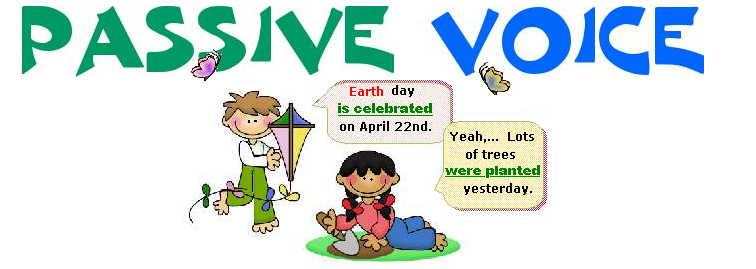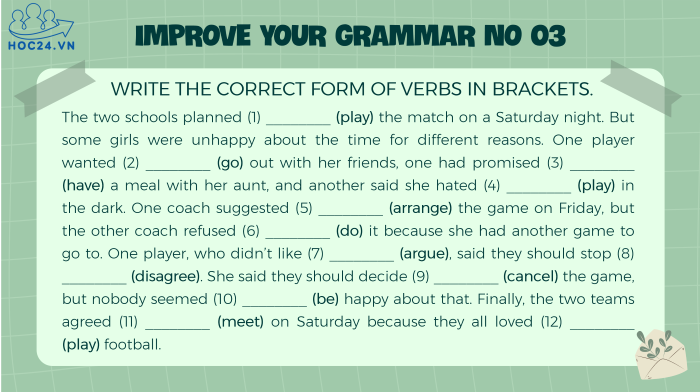 Công thức chung
S+BE+V past participle(P2)
Điều kiện để có thể biến đổi 1 câu từ chủ động thành bị động:
Công thức chung
S+BE+V past participle(P2)
Điều kiện để có thể biến đổi 1 câu từ chủ động thành bị động:
- V trong câu chủ động phải là Transitive Verb (Ngoại động từ: đòi hỏi có O theo sau)
- Các O (trực tiếp, gián tiếp) phải được nêu rõ ràng
Quy tắc:Khi biến đổi 1 câu từ chủ động sang bị động ta làm theo các bước sau:
a. Xác định S, V, O và thì của V trong câu chủ động.
b. Lấy O trong câu chủ động làm S của câu bị động.
Lấy S trong câu chủ động làm O và đặt sau By trong câu bị động.
c. Biến đổi V chính trong câu chủ động thành P2 (Past Participle) trong câu bị động.
d. Thêm To be vào trước P2 trong câu bị động (To be phải chia theo thời của V chính trong câu
chủ động và chia theo số của S trong câu bị động).
Bảng công thức các thì ở thể bị động:|
Tense |
Active |
Passive |
|
Simple Present |
S + V + O |
S+be +P2 + by + O |
|
Present Continuous |
S + am/is/are + V-ing + O |
S+ am/is/are + being+ P2 + by + O |
|
Present Perfect |
S + has/have + P2 + O |
S + has/have + been + P2 + by + O |
|
Simple Past |
S + V-ed + O |
S + was/were + P2 + by + O |
|
Past Continuous |
S + was/were + V-ing + O |
S+ was/were + being+ P2 + by + O |
|
Past Perfect |
S+ had + P2+O |
S + had + been + P2 + by + O |
|
Simple Future |
S + will/shall + V + O |
S + will + be + P2 + by + O |
|
Future Perfect |
S + will/shall + have + P2 + O |
S + will + have + been + P2 + by + O |
|
Be + going to |
S + am/is/are + going to + V + O |
S + am/is/are + going to + be + P2 + by + O |
|
Model Verbs |
S + model verb + V + O S + modal Verb + have +P2 |
S + model verb + be + P2 + by + O S + modal Verb + have been +P2 |
VD: It's your duty to make tea today. >> You are supposed to make tea today. 2/ It's impossible to+Vinf -->bị động: S + can't + be + P2
VD: It's impossible to solve this problem. >> This problem can't be solve. 3/ It's necessary to + Vinf --> bị động: S + should/ must + be +P2
VD: It's necessary for you to type this letter. >> This letter should/ must be typed by you. 4/ Mệnh lệnh thức + Object. --> bị động: S + should/must + be +P2.
VD: Turn on the lights! >> The lights should be turned on.
BỊ ĐỘNG CỦA CẤU TRÚC " NHỜ AI LÀM GÌ"
| Chủ động | Bị động |
| Have + sb + V | Have + st + P2 |
| Get + sb + to V | Get + st + P2 |
I have my father repair my bike. >> I have my bike repaired by my father.
I get my father to wash my car >> I get my car washed by my father
>> Chủ động: S + V + sb Ving
Bị động: S + V + sb/st + being + P2
VD: I like you wearing this dress.
>> I like this dress being worn by you.
BỊ ĐỘNG CỦA ĐỘNG TỪ MAKE/ LET
MAKE
Công thức chủ động : S + make + sb+ Vinf --> Bị động: S +be+ made + to + Vinf
VD: They make me make tea >> I am made to make tea.
LET
Công thức chủ động: S + let + sb + Vinf --> Bị động: let + sb/st + be P2 hoặc be allowed to Vinf
VD:
My parents never let me do anything by myself.
→ My parents never let anything be done by myself or I'm never allowed to do anything by myself by my parents.
They don’t let us beat their dog.
→They don’t let their dog be beaten or We are not allowed to beat their dog.
BỊ ĐỘNG CỦA CÁC ĐỘNG TỪ TRI GIÁC( Vp --- verb of perception: see, watch, notice, hear, look…)
1/ Cấu trúc chủ động: S + Vp + sb + Ving
>> Bị động: S + be + P2(of Vp) + Ving
(Ai đó chứng kiến người khác làm gì và chỉ thấy 1 phần của hành động hoặc 1 hành động đang diễn ra bị 1 hành động khác xen vào)
VD: We saw her overhearing us >> She was seen overhearing us.
2/ Cấu trúc 2: S + Vp + sb + V
>> Bị động: S + be + P2(of Vp) + to +Vinf
(Ai đó chứng kiến người khác làm gì từ đầu đến cuối)
* NOTE: riêng các động từ : feel, find, catch thì chỉ sử dụng công thức 1.
1/ Khi main verb ở thời HIỆN TẠI
Công thức:
People/they + think/say/suppose/believe/consider/report.....+ that + clause.
>> Bị động:
a/ It's + thought/said/ supposed/believed/considered/reported...+ that + clause
( trong đó clause = S + Vinf + O)
b/ Động từ trong clause để ở thì HTDG hoặc TLĐ
S + am/is/are + thought/ said/supposed... + to + Vinf
VD: People say that he is a good doctor.
>> It's said that he is a good doctor.
He is said to be a good doctor.
c/ Động từ trong clause để ở thời QKDG hoặc HTHT.
S + am/is/are + thought/ said/ supposed... + to + have + P2.
VD: People think he stole my car.
>> It's thought he stole my car.
He is thought to have stolen my car.
People/they + thought/said/supposed...+ that + clause.
>>Bị động:
a/ It was + thought/ said/ supposed...+ that + clause.
b/ Động từ trong clause để ở thì QKĐ:
S + was/were + thought/ said/ supposed... + to + Vinf.
VD: People said that he is a good doctor.
>> It was said that he is a good doctor.
He was said to be a good doctor.
c/ Động từ trong clause ở thì QKHT
S + was/were + thought/ said/ supposed... + to + have + P2.
VD: They thought he was one of famous singers.
>> It was thought he was one of famous singers. He was thought to be one of famous singers. BỊ ĐỘNG CỦA 7 ĐỘNG TỪ ĐẶC BIỆT Các động từ : suggest, require, request, order, demand, insist(on), recommend.
Công thức:
S + suggest/ recommend/ order/ require... + that + clause.
( trong đó clause = S + Vinf + O)
>> Bị động:
It + was/ will be/ has been/ is... + P2 (of 7 verbs) + that + st + be + P2.
( trong đó "be" là không đổi vì động từ trong clause ở câu chủ động ở dạng Vinf)
VD: He suggested that she buy a new car. >> It was suggessted that a new car be bought. BỊ ĐỘNG CỦA CẤU TRÚC CHỦ NGỮ GIẢ " IT". Công thức:
It + be + adj + for sb + to do st.
>>Bị động:
It + be + adj + for st + to be done.
VD: It is difficult for me to finish this test in one hour >> It is difficult for this test to be finished in one hour. BỊ ĐỘNG TRONG TRƯỜNG HỢP 2 TÂN NGỮ Trong đó : Oi = Indirect Object.
Od = Direct Object.
Công thức:
S + V + Oi + Od
>>Bị động:
1/ Oi + be + P2( of V) + Od.
2/ Od + be + P2( of V) + to Oi.
( riêng động từ " buy" dùng giới từ " for" ).
VD: My friend gave me a present on my birthday.
>> A present was given to me by my friend on my birthday.
I was given a present on my birthday by my friend.
tick mk với nhé![]()
2. Cấu trúc câu bị động với các thì trong tiếng anh
|
Các thì |
Chủ động |
Bị động |
|
1. Hiện tại đơn |
S + V(s/es) + O Ví dụ: - Mary studies English every day. |
S+ is/am/are + VpII + (by + O) Ví dụ: - English is studied by Mary everyday. |
|
2. Hiện tại tiếp diễn |
S + is/am/are + V-ing + O Ví dụ: - He is planting some trees now. |
S + is/am/are + being + VpII+ (by + O) Ví dụ: - Some trees are being planted (by him) now. |
|
3. Quá khứ đơn |
S + V-ed + O Ví dụ: - She wrote a letter yesterday. |
S + was/were + VpII + (by + O) Ví dụ: - A letter was written (by her) yesterday. |
|
4. Quá khứ tiếp diễn |
S + was/were + V-ing + O Ví dụ: - They were buying a car at 9 am yesterday. |
S + was/were +being + VpII + (by + O) Ví dụ: - A car was being bought at 9 am yesterday. |
|
5. Hiện tại hoàn thành |
S + have/ has + VpII + O Ví dụ: - My parents have given me a new bike on my birthday. |
S + have/ has + been + VpII + (by + O) Ví dụ: - A new bike has been given to me by my parents on my birthday. |
|
6. Hiện tại hoàn thành tiếp diễn |
S + have/ has + been + V-ing + O
Ví dụ: - John has been repairing this car for 2 hours. |
S + have/ has + been + being +VpII+(by + O) Ví dụ: - This car has been being repaired by John for 2 hours. |
|
7. Quá khứ hoàn thành |
S + had + VpII + O Ví dụ: - He had finished his report before 10 p.m yesterday. |
S + had + been + VpII + (by O) Ví dụ: - His report had been finished before 10 p.m yesterday. |
|
8. Quá khứ hoàn thành tiếp diễn |
S + had + been + V-ing + O
Ví dụ: - I had been typing the essay for 3 hours before you came yesterday. |
S + had + been + being + VpII + (by + O) Ví dụ: - The essay had been being typed for 3 hours before you came yesterday. |
|
9. Tương lai đơn |
S + will + V(nguyên thể) + O Ví dụ: - She will do a lot of things tomorrow. |
S + will + be + VpII + (by O) Ví dụ: - A lot of things will be done tomorrow. |
|
10. Tương lai tiếp diễn |
S + will + be +V-ing + O Ví dụ: - She will be taking care of her children at this time tomorrow |
S + will + be + being + VpII + (by O) Ví dụ: - Her children will be being taken care of at this time tomorrow. |
|
11. Tương lai hoàn thành |
S + will + have + VpII + O Ví dụ: - She will have finished her studying by the end of this year. |
S + will + have + been + VpII + (by O) Ví dụ: - Her studying will have been finished by the end of this year. |
|
12. Tương lai hoàn thành tiếp diễn |
S + will + have + been + V-ing + O Ví dụ: - I will have been teaching English for 5 years by next week. |
S + will + have +been + being + VpII + (by O) Ví dụ: - English will have been being taught by me for 5 years by next week. |













